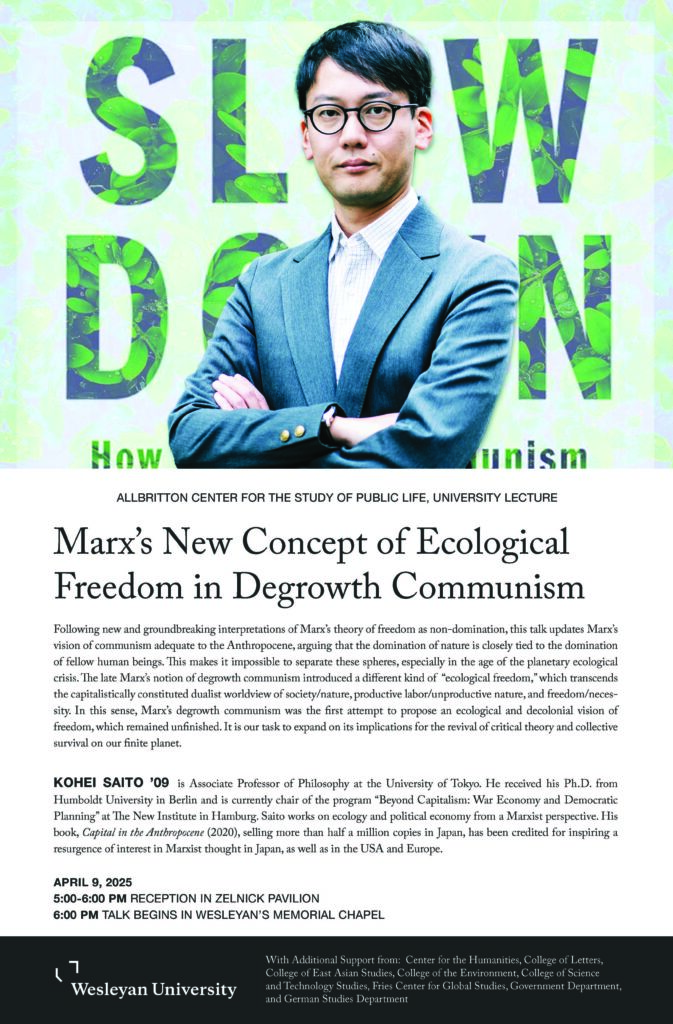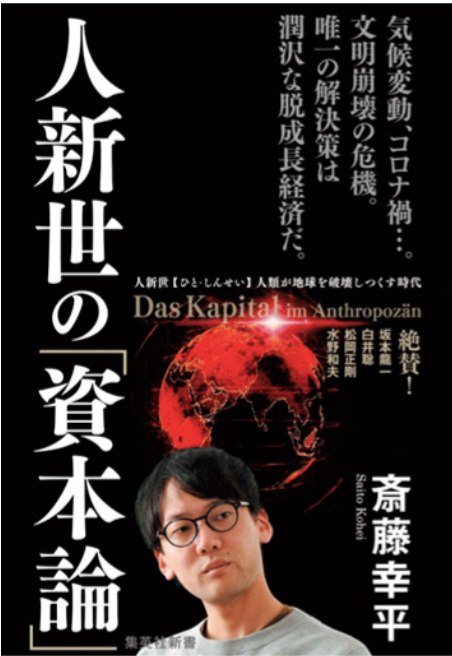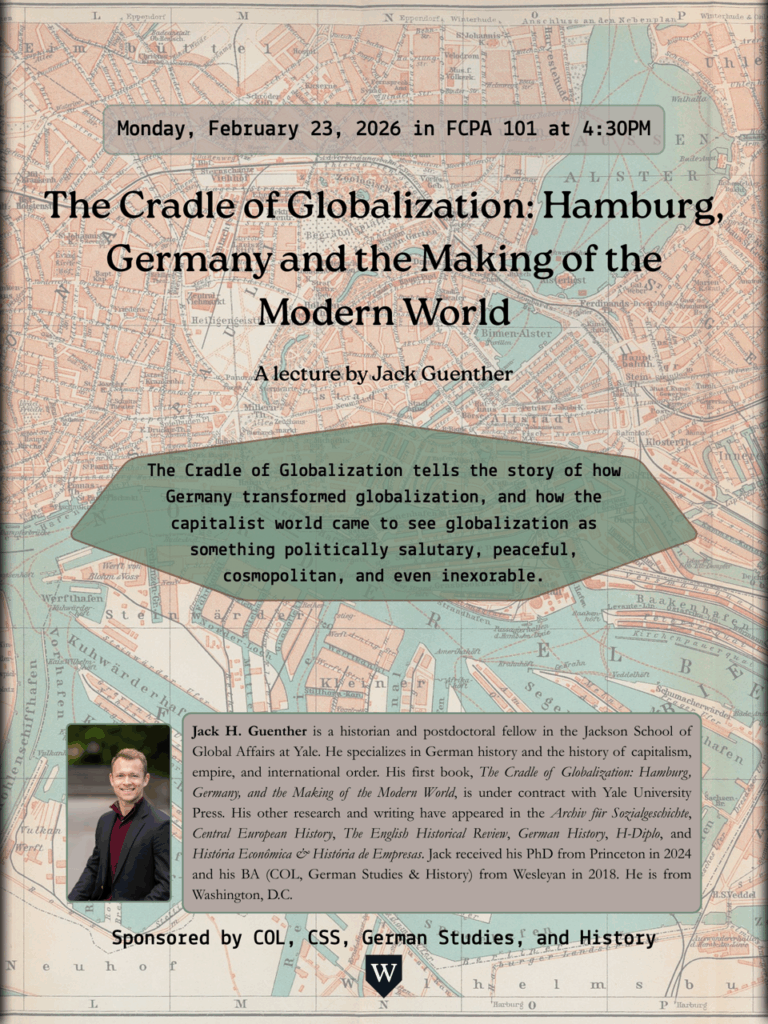
Alumni
DAAD Study Scholarship
The German government, through the German Academic Exchange Service (DAAD), sponsors a variety of post-graduation research in Germany. Especially of note will be the DAAD Study Scholarship for a full Master’s degree program in all academic fields except the visual/performing arts, available to graduating seniors or recently graduated students. Knowledge of German is NOT required IF the program is taught in English.
You can find more information on the scholarships here, application instructions on the Master’s scholarship here, and further application instructions for all different kinds of scholarships here. A database for the more than 20,000 different programs is here.
For the Master’s Studies scholarship, Wesleyan University is a DAAD Partner University, which means that the university is able to nominate one priority candidate and submit further evaluations of each applying candidate. Any interested student should contact Prof. Martin Baeumel at mbaeumel@wesleyan.edu.
The deadline for internal submissions via email is October 13, 2025, the deadline for submission to the DAAD is October 31, 2025.
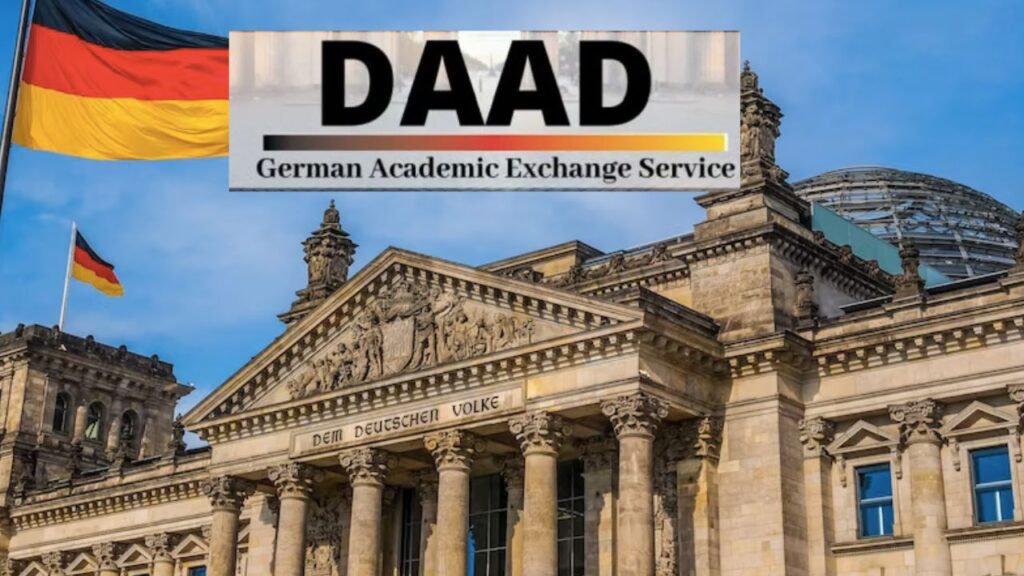
Jason Kavett ’09 translates Paul Celan’s letters to Gisèle Celan-Lestrange
Jason Kavett ’09 has translated the correspondence between the poet Paul Celan and his wife, the artist Gisèle Celan-Lestrange. His translation appears in the New York Review Books Poets imprint:
“Letters to Gisèle presents the letters Celan wrote to his wife, the French visual artist Gisèle Celan-Lestrange, over the course of close to twenty years, along with letters to the couple’s son, Eric, and letters from Gisèle to Paul. They provide an intimate view of his literary career and troubled life, which was marked by repeated stays in psychiatric clinics. They also provide an unparalleled glimpse into Celan’s poetic workshop, including his own word-for-word renderings from German into French of more than a dozen of his poems. These he addressed to Gisèle as an ongoing, informal German lesson. They figure too as messages from the heart. Presented here trilingually, these overlapping versions of Celan’s poems open up new dimensions of his famously hermetic poetry, as dazzling as it is dark.“
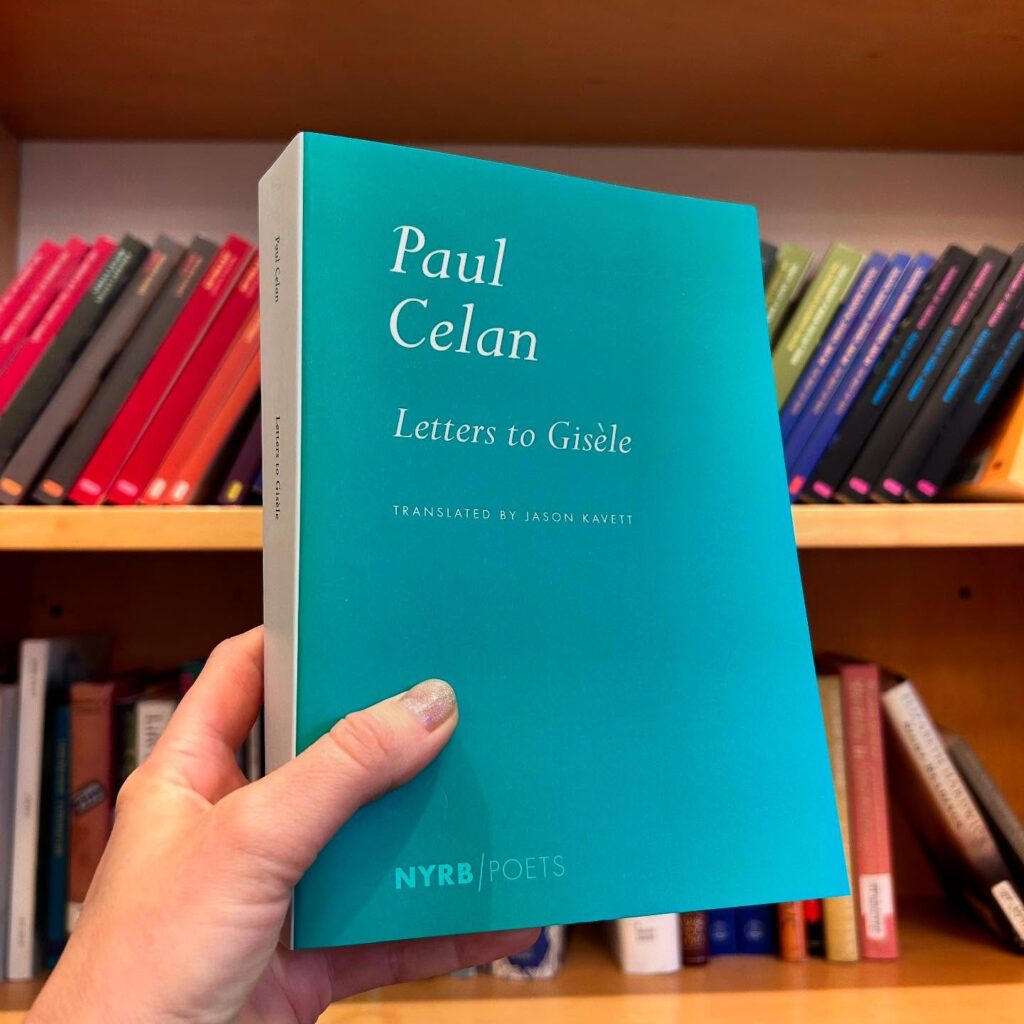
Jason’s translation has been reviewed in the New York Times and the Chicago Review of Books.
Joanna Paul’18 received a Fulbright ETA scholarship
Joanna Paul graduated from Wesleyan in 2018 with a BA in psychology and sociology and a German minor! During her sophomore year in 2016 she had the opportunity to study abroad in Germany for six months with Duke in Berlin and it was the best time of her life!
Joanna will be graduating from an MPH/MSW dual degree program in Chicago this May and just accepted an award for a Fulbright English Teaching Assistantship in Hessen, Germany for ’24-’25. Joanna is thrilled about the opportunity to return to Germany after all these years to reconnect with her host families/exchange students from high school and college, as well as to improve her German skills and volunteer in her free time.
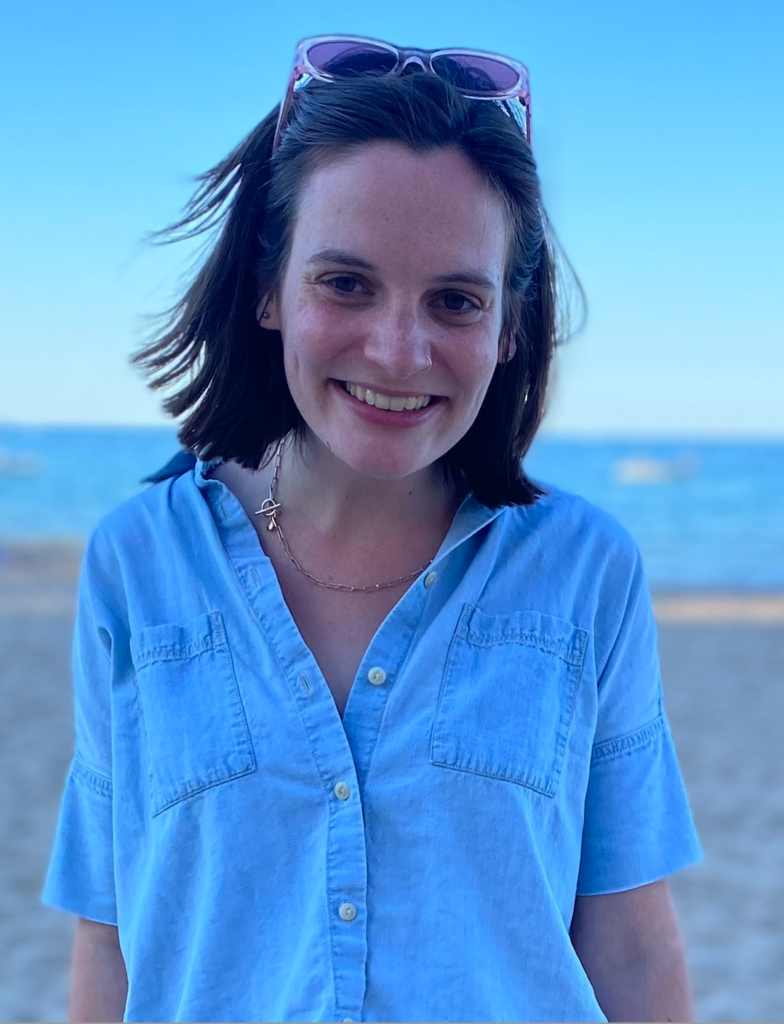
Can Shrinking Be Good for Japan? A Marxist Best Seller Makes the Case.
Associated Professor Kohei Saito ’09 teaches philosophy at Tokyo University. He received his BA from Wesleyan University where he also studied German. He did his PhD in philosophy at Humboldt Universität in Berlin, Germany. His Karl Marx’s Ecosocialism: Capital, Nature and the Unfinished Critique of Political Economy (New York: Monthly Review Press, 2017) was awarded the most prestigious academic award for Marxian studies, the Isaac Deutscher Memorial Prize, in 2018. This makes him the youngest recipient of that honor. The book has been published in eight languages.
Saito’s “Capital” in the Anthropocene (Tokyo: Shueisha, 2020) opened up a pathbreaking interpretation of Marx’s theory of postcapitalism in the age of climate crisis, selling 500,000 copies in Japan. His introduction to Marx’s Capital that was utilized as a textbook for a TV program on the NHK network has sold more than 100,000 copies to date.
Capital in the Anthropocene received “Best Asian Books of the Year” from the Asia Book Awards 2021 Committee.
His book was recently also reviewed in the German newspaper Süddeutsche Zeitung.
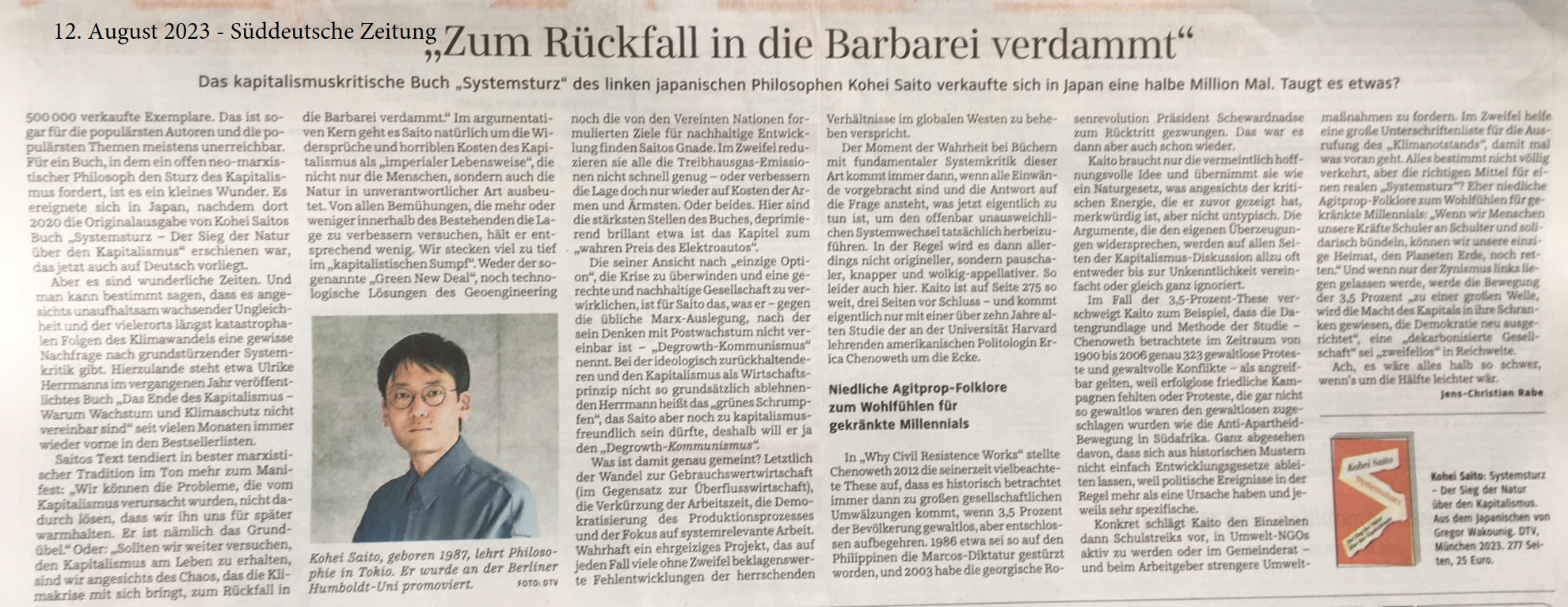
On September 5th, 2023 the NYT published the following article by Ben Dooley and Hisako Ueno.
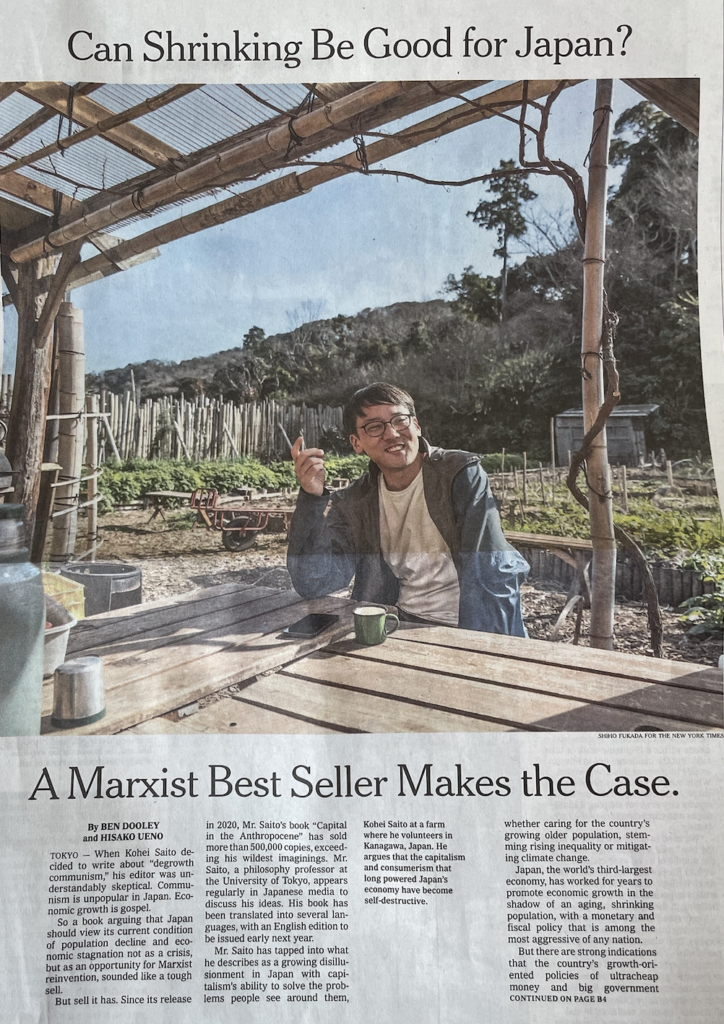
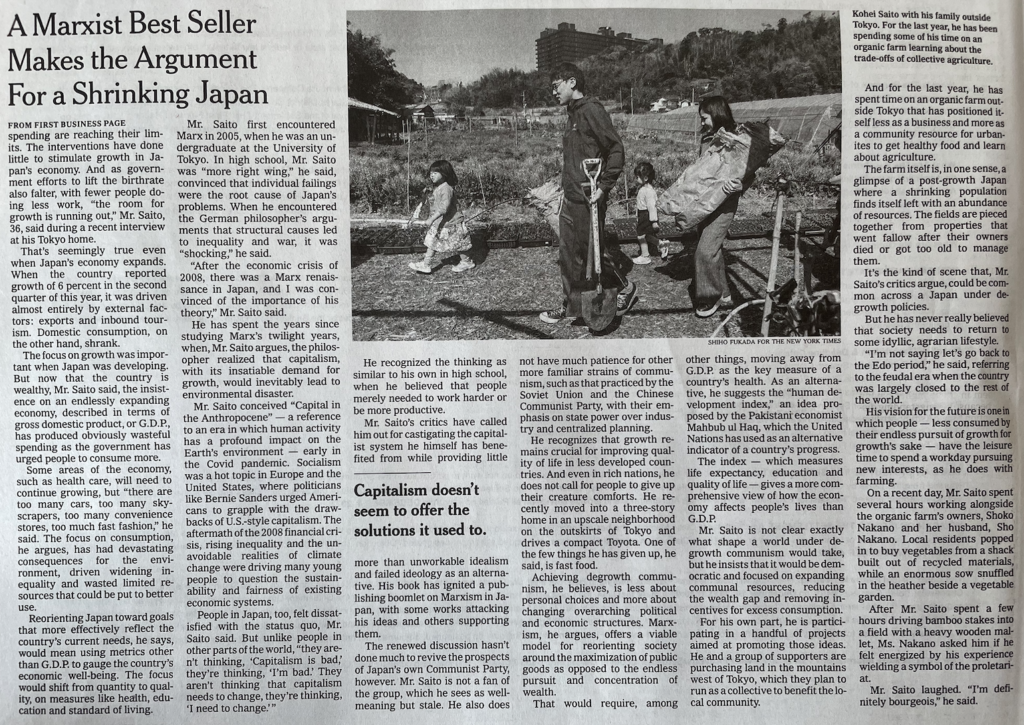
News From Our Recent Alumni

Several of our GRST majors and minors have been living and studying in Germany this fall. I asked them to share some of their experiences with us. So far, I have received three letters that I would like to share with you. The first letter is from Evelyn Mesler ‘21, who majored in German Studies, Biology, and Data Analysis. She is currently pursuing a master’s degree in Infection Biology at the Universität zu Lübeck in Lübeck, Germany.
The second letter is from Jenna Lacey ’21. She majored in Government and minored in German Studies. Currently, she is studying Public Policy and Social Change at the University of Tübingen and has good tips for anyone who is thinking about studying in Germany.
There are many ways to go about spending a year or two in Germany after graduation. You might want to apply for a German Exchange scholarship (DAAD) like Evelyn Mesler ’21. If you are a graduate student at Wesleyan, you can also apply for a Baden-Württemberg Exchange scholarship to study and/or do research at one of the nine prestigious universities in Baden-Württemberg. If you are interested in one of these scholarships, please talk to my colleagues in the GRST department, Profs. Ulrich Plass, Martin Bäumel or me (Iris Bork-Goldfield). Another good option—but only for American citizens—to study, research or teach English (ESL) in Germany, is to apply for a Fulbright scholarship. There are also opportunities to teach ESL in Austria with a Fulbright scholarship (USTA).
The third letter is from Patrick Wolff ’21, who is currently living and studying in Göttingen. He received a Congress-Bundestag Youth Exchange scholarship. This scholarship for Young Professionals (CBYX) is a fellowship funded by the German Bundestag and U.S. Department of State that annually provides 75 American and 75 German young professionals between the ages of 18½ and 24 with the opportunity to spend one year in each other’s countries: studying, interning, and living with hosts on a cultural immersion program.
I hope you enjoy their news!
Iris Bork-Goldfield (Adj. Professor of GRST)
Evelyn Mesler’s news from Lübeck
With the help of the German Studies department and particular support from Professor Krishna Winston, I was able to apply for a master’s scholarship from the German Academic Exchange Service (Deutscher Akademischer Austauschdienst, or DAAD) during the fall of my senior year at Wesleyan. The scholarship from the DAAD unlocked an amazing opportunity to study Infection Biology here in Germany.
As of writing this, I have been in Lübeck for almost two months, and each day feels like a dream.  My master’s program is incredibly rigorous- in the first semester alone, I must complete seven classes (and I thought 5 Wesleyan classes was a full schedule: I now feel so naive). But the classes are taught by clinicians, diagnosticians, public health experts, and researchers studying diseases that I find incredibly fascinating, so I feel lucky to attend their lectures. There is a strong network of international students at my university, and I have been able to meet students from all over the world while we do activities like cooking, ice skating, and lantern making for St. Martin’s Day. Next weekend, I am travelling with our international group to Berlin.
My master’s program is incredibly rigorous- in the first semester alone, I must complete seven classes (and I thought 5 Wesleyan classes was a full schedule: I now feel so naive). But the classes are taught by clinicians, diagnosticians, public health experts, and researchers studying diseases that I find incredibly fascinating, so I feel lucky to attend their lectures. There is a strong network of international students at my university, and I have been able to meet students from all over the world while we do activities like cooking, ice skating, and lantern making for St. Martin’s Day. Next weekend, I am travelling with our international group to Berlin.
The city of Lübeck feels as though it came right out of a storybook: narrow cobblestoned streets with small arches leading to courtyards filled with roses and ivy climbing up old brick buildings. The city itself is an island surrounded by canals, so on sunny days I often walk along the bank and watch rowers pass me by.
Now that Christmas is coming, the city is being transformed into a Weihnachts wonderland. On my street, evergreens line the sidewalk and tinsel, and large toys are suspended across the street from one house window to another. Tonight, is the grand opening of the Weihnachtsmarkt, so some colleagues and I are planning on going together and enjoying spiced Glühwein, Lebkuchen, and probably some bratwursts, too 🙂
I am so grateful to have made it to Germany, and I would never have accomplished this dream without the support and fantastic education I received from Wesleyan and the German Studies department, in particular. I hope to pay their generosity forward and would love to provide other students interested in studying in Germany with help and guidance in their search!
Jenna Lacey’s news from Tübingen

My program here at Tübingen is very research focused and takes a broadly comparative approach to public policy. I’ve been enjoying my classes and cohort so far and living in Germany has been really lovely. I’m soaking up as much of the good public transit as I can. I’ve visited a few castles, eaten Stockbrot, bread baked over a bonfire (like a marshmallow), and been surprised by a bus strike.
Tips for people thinking of studying in Germany
- Adjust your study habits: The way classes at German universities tend to work is you attend lectures, you might have to give a presentation at some point for a couple of ECTSs (European Credit Transfer System), and then you have an exam which determines your grade for the class. You might have smaller assignments, but these are usually just graded for completion and part of the requirement to get credit for actually attending and participating in lectures. You also don’t have midterms that force you to solidify your knowledge of the first half of the course, thus cutting down on the number of materials you have to study for your finals. So develop study habits that force you to do this sort of knowledge solidification: write out potential exam questions about that week’s material, get together with friends halfway through the semester and pretend you’re studying for a midterm, etc.
- Figure out as much of your general living affairs as you can prior to arriving in Germany. Apply for health insurance early, get a bank account set up early if you can, and if possible, it may be beneficial to apply for your residence permit before you arrive. This isn’t strictly necessary if, by virtue of your citizenship, you’re allowed to enter the country without a permit and then apply for one (this is the case for U.S. citizens), but it may take a lot of stress out of the first couple of months of living in Germany.
- Listen to native speech as much as possible. Watch Tagesschau, listen to podcasts (like WesGerman), watch videos on the Easy German YouTube channel. The German classes at Wes are excellent, but at the end of the day your professors are the only native speakers you have contact with on a regular basis. Listening comprehension is extremely important, whether your intended program is completely or partially in German, or you only need German for non-academic settings.
Patrick’s news from Göttingen

Hello! I’m Patrick Wolff (’21) and I’m a member of the 38th CBYX cohort. The 11-month fellowship stresses cultural exchange through three phases: language learning, a semester at a German university, and gaining work experience.
In the first two months I lived in Cologne to attend an intensive language course. Class was Monday-Friday from 9:00-1:00. During my time there I lived with a host family—an essential and highly recommended component of the program—for the purpose of full cultural immersion. In my free time I got to know the other 35 Americans from the program located there. Together we traveled to nearby cities by train and bike, visited museums and concerts, gathered for potluck dinners, played sports and games in the parks, and experienced Cologne’s abundant nightlife.
In October, I moved to my permanent placement in Göttingen, a smaller city in Lower Saxony. Since then, I have attended lectures on the topic of business management at the Georg-August-Universität and I’ve continued my language learning in an upper-level German course. I also volunteer at the kindergarten where my host mom works on days when I don’t have class. I have been fortunate to meet international students through the Erasmus Student Network and German students in my classes, at the Mensa, and in town. Visiting friends and other cities on the weekends is easy with my semester ticket, usually included in the (extremely low) university semester fees.
Currently I am on the search for internships in the Data Analysis and Consulting areas, as in February the semester will come to an end, and I will begin working in one or more positions until late June. Program members are encouraged to stay in their permanent placement cities for the internship phase, although relocation to other cities for work purposes is possible!
If you have any questions about the program, application, or life in Germany in general, I would love to connect! You can reach me here anytime pwolff@wesleyan.edu.

Miranda Haymon ’16 talks about her career and what it meant to study abroad in Berlin

Miranda Haymon ’16, GRST and THEA double major discussed her career after graduation and her artistic process with Sam Morreale ’19 on March 17th. Her study abroad semester in Berlin during her sophomore played an important role in her life. She emphasized how important and helpful it was for her theatre career to be a GRST major and getting a liberal arts education. You can watch their conversation on YouTube.
Haymon’s upcoming radio play version of Pedro Pietri’s “The Masses Are Asses” (1974) will be aired on WESU Middletown 88.1FM this spring.

This picture was taken from Miranda’s bb_Brecht performance. Here is a video clip from it–> https://www.instagram.com/tv/CKMIonfjoq_/
You can follow Miranda on Instagram.
Miranda Haymon (she/they) is a Princess Grace Award/Honoraria-winning director, writer and curator. Recent projects include A Cakewalk (Garage Magazine & Gucci), Really, Really Gorgeous (The Tank), Everybody (Sarah Lawrence College), In the Penal Colony (Next Door @ New York Theatre Workshop, The Tank) and Mondo Tragic (National Black Theater). Haymon is a Resident Director at Roundabout Theatre Company and The Tank, a New Georges Affiliate Artist, a Usual Suspect at New York Theatre Workshop, a Space on Ryder Farm Creative Resident, member of the Lincoln Center Theater Directors Lab, and the Wingspace Mentorship Program. Haymon has held directing fellowships at WP Theater, New York Theatre Workshop, Manhattan Theatre Club, Roundabout Theatre Company, and Arena Stage. Haymon graduated from Wesleyan in 2016. For more information, please visit www.mirandahaymon.com.
Sam Morreale (they/them) is an advocate and facilitator for QTBIPOC+ storytellers and makers. Most of their work takes form through producing, directing, and consulting, particularly with a practice rooted in anti-racism and anti-oppression, transformative justice, healing and harm reduction. They have a unique view of the theatrical landscape, having worked in various capacities throughout the American Theater Industry quite early in their career. Recent Work: Facilitator/Curator for Rattlestick Playwright’s Theater, Community Conversations. Consultant: ART/NY, Center Theatre Group, Boston Court Pasadena.
Translating Unconventional Narratives: A Conversation with Philip Boehm ’80 and Dr. Shelley Frisch
The Helen & Kurt Wolff Translator’s Prize is awarded each spring to honor an outstanding translation from German into English published in the USA the previous year. Established in 1996, the prize has been administered by the Goethe-Institut New York since 2015. This year’s winner is Wesleyan Alum Philip Boehm ’80 for his translation of Christine 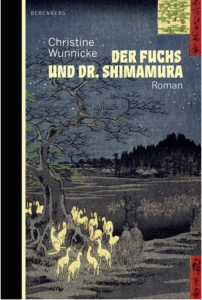 Wunnicke’s novel The Fox and Dr. Shimamura (New Directions, 2019).
Wunnicke’s novel The Fox and Dr. Shimamura (New Directions, 2019).
The five-member jury, led by Dr. Shelley Frisch reached a decision after narrowing an initial twenty-one titles submitted by American publishers, titles spanning diverse genres and over 600 years of German language writers, to a shortlist of four translators, including two translations by Philip Boehm. This is the second time that Philip Boehm has been awarded the Wolff Prize – he last won in 2013 for his translation of Gregor von Rezzori’s An Ermine in Czernopol – and he is the only translator to have received the honor twice.
On May 9, 2020, Philip Boehm was welcomed to a special online conversation with jury chair Shelley Frisch on the arts of translation. The discussion includes a reading from Boehm’s award-winning translation and comments from author Christine Wunnicke. Wunnicke’s novel is a unique and fantastical work that puts the virtuosity and sensitivity of the translator in the spotlight. Drawing on a true story, this book about the power of memory and narrative presents a mythical and fractured tale of a retired doctor in nineteenth-century Japan who reflects on the memories of his earlier days in the Shimane prefecture, where he cured women of fox possession.
Source: https://www.youtube.com/watch?v=0TEFz1oyuY4
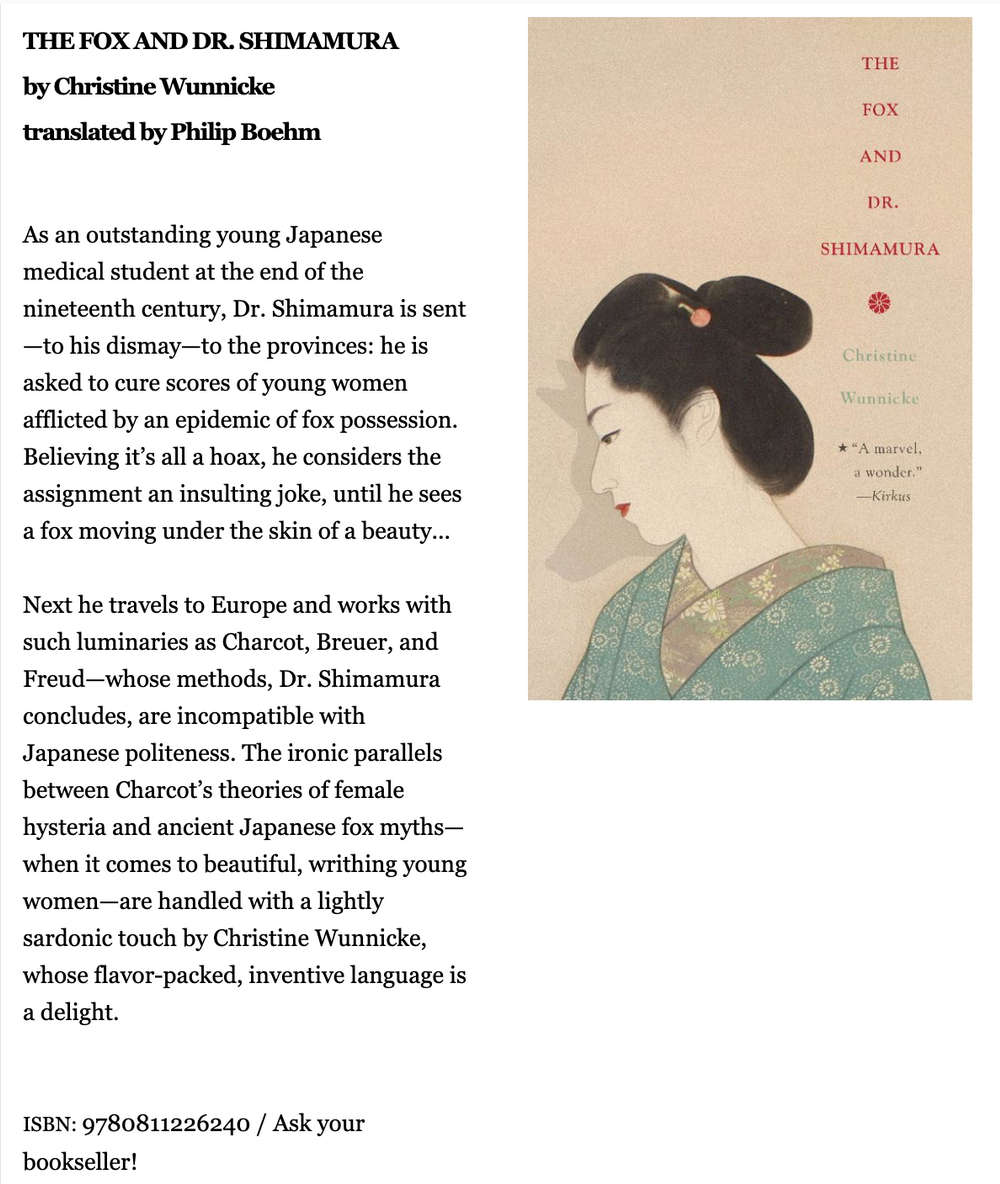
Why Study German at Wesleyan?
Meet some of our German Studies Alums!
 Adam Baltner ’13 I was interested in philosophy when I came to Wesleyan and figured it would be a good idea to take some German classes so that I could read important source texts in their original form. Little did I know how much that decision would influence my future. Having enjoyed my intro language classes so much, I studied abroad in the spring of my sophomore year and declared German as a second major (in addition to College of Letters). After graduating I moved to Austria to teach high-school English through a Fulbright-affiliated fellowship. Not quite ready to return to the US after that, I subsequently did a Master of Arts in German at the University of Vienna, a degree program for which the Wes German department prepared me brilliantly. I’ve since stayed in Vienna and returned to working as a high-school English teacher at a bilingual school in the city, but on the side, I’m putting my academic German skills to good use as a professional translator, mostly of texts written in the critical social sciences and humanities. If you have questions, just email me.
Adam Baltner ’13 I was interested in philosophy when I came to Wesleyan and figured it would be a good idea to take some German classes so that I could read important source texts in their original form. Little did I know how much that decision would influence my future. Having enjoyed my intro language classes so much, I studied abroad in the spring of my sophomore year and declared German as a second major (in addition to College of Letters). After graduating I moved to Austria to teach high-school English through a Fulbright-affiliated fellowship. Not quite ready to return to the US after that, I subsequently did a Master of Arts in German at the University of Vienna, a degree program for which the Wes German department prepared me brilliantly. I’ve since stayed in Vienna and returned to working as a high-school English teacher at a bilingual school in the city, but on the side, I’m putting my academic German skills to good use as a professional translator, mostly of texts written in the critical social sciences and humanities. If you have questions, just email me.
Caroline Adams ’19 I double-majored in German and American Studies. Some of my favorite German classes included “Forward, without Forgetting: The GDR in Literature and Film” and “Deutschland Multikulti: Expressions of Germany’s Cultural Diversity.” In the summer before my senior year, I worked as a research assistant for Professor Iris Bork-Goldfield on the topics of family history and German-Jewish migration to Brooklyn in the mid-nineteenth century. The German department’s Reihlen fund enabled me to conduct research for my senior thesis, “Imagining Indianer: Karl May’s Winnetou and Germans’ Enduring Fantasies about Native Americans.” Currently, I am enrolled in a Master program in American Studies at Brown University. Questions? Just send me an email.
Studies. Some of my favorite German classes included “Forward, without Forgetting: The GDR in Literature and Film” and “Deutschland Multikulti: Expressions of Germany’s Cultural Diversity.” In the summer before my senior year, I worked as a research assistant for Professor Iris Bork-Goldfield on the topics of family history and German-Jewish migration to Brooklyn in the mid-nineteenth century. The German department’s Reihlen fund enabled me to conduct research for my senior thesis, “Imagining Indianer: Karl May’s Winnetou and Germans’ Enduring Fantasies about Native Americans.” Currently, I am enrolled in a Master program in American Studies at Brown University. Questions? Just send me an email.
 Wy Ming Lin ’16 I majored in German Studies and Neuroscience and Behavior. After Wes, I wanted to do something with both majors, so what better way to combine the two than by moving to Germany and pursuing some research opportunities? That’s exactly what I did through the Congress-Bundestag Youth Exchange for Young Professionals where I had the chance to spend a year in Leipzig. I did an internship at the Max Planck Institute there and worked with some amazing and brilliant neuroscientists who convinced me to keep studying in Germany. Currently, I am doing my MA in Tübingen and plan on continuing on with a PhD in Germany! I’ll be happy to answer any questions just email me.
Wy Ming Lin ’16 I majored in German Studies and Neuroscience and Behavior. After Wes, I wanted to do something with both majors, so what better way to combine the two than by moving to Germany and pursuing some research opportunities? That’s exactly what I did through the Congress-Bundestag Youth Exchange for Young Professionals where I had the chance to spend a year in Leipzig. I did an internship at the Max Planck Institute there and worked with some amazing and brilliant neuroscientists who convinced me to keep studying in Germany. Currently, I am doing my MA in Tübingen and plan on continuing on with a PhD in Germany! I’ll be happy to answer any questions just email me.
 Christina Sickinger ’18 I double majored in German Studies andEconomics. I studied abroad in Berlin during the fall of my junior year. Now, I am living in New York City, where I work as a municipal credit analyst at Aberdeen Standard Investments. My team manages funds of municipal bonds, which provide local governments with money for infrastructure and other community needs. I continue to enjoy reading German literature (and drinking German beer) in my spare time. Questions, just send me an email.
Christina Sickinger ’18 I double majored in German Studies andEconomics. I studied abroad in Berlin during the fall of my junior year. Now, I am living in New York City, where I work as a municipal credit analyst at Aberdeen Standard Investments. My team manages funds of municipal bonds, which provide local governments with money for infrastructure and other community needs. I continue to enjoy reading German literature (and drinking German beer) in my spare time. Questions, just send me an email.
Carter Dean ’18 I graduated from CSS and German Studies. German Studies, with its wide breadth of courses in film, literature and politics, compliments CSS’ focus on history and social theory with a more specific survey of German culture and history. In retrospect, minoring in German Studies also gave me the language skills crucial for my post-grad life: I’ve moved to Cologne, Germany for research and graduate school. All in all, the department’s professors are as patient as they are generous with their time and guidance. I would gladly speak to any prospective GRST students, especially if they are considering balancing an intensive program like CSS with a minor or double-major. Questions? Just email me.
Anna Apostolidis ’19 I graduated with a double major in Anthropology and German Studies and a certificate in Social, Cultural, and Critical Theory. I wrote my thesis about the Humboldt-Forum, a new museum in Berlin, and the politics of remembering German colonial history through the lens of the museum. Through funding from the German Department, I was able to travel to Berlin for a month to study the museum. I am currently working at Covey Law in New York City, a firm that provides legal aid to artists and musicians who are applying for visas to work on the US. The research experience and the knowledge I gained about the arts and international cultural exchange through the combination of the German Studies and Anthropology programs helped prepare me for this exciting opportunity. I hope to eventually pursue a PhD in Anthropology. Questions? Just send me an email.
Madalene Smith-Huemer ’14 I studied German and History at  Wesleyan, with a focus on European intellectual history. After graduating, I worked in the Office of External Relations at the Atlantic Council, a foreign policy think tank in Washington, DC. In May, I graduated from the M.S. in Foreign Service program at Georgetown University. Currently, I am living in San Francisco, where I work as an Executive with the global communications advisory Brunswick Group. Questions? Just send me an email.
Wesleyan, with a focus on European intellectual history. After graduating, I worked in the Office of External Relations at the Atlantic Council, a foreign policy think tank in Washington, DC. In May, I graduated from the M.S. in Foreign Service program at Georgetown University. Currently, I am living in San Francisco, where I work as an Executive with the global communications advisory Brunswick Group. Questions? Just send me an email.
 Jack Guenther ’18 After leaving Wesleyan in Spring 2018, I entered the PhD program in history at Princeton University. The ideas for my doctoral research began in the Wesleyan German Studies Department: studying abroad in Hamburg, in fact. Those ideas took further shape in a joint history, COL, and German Studies senior thesis with Professors Bork-Goldfield and Grimmer-Solem. My research on globalization and migration takes me both Germany and elsewhere–this summer it was Buenos Aires. A year from now, I will begin teaching courses down in Princeton, and I will spend the two years thereafter in Germany and Latin America, completing my dissertation research. Questions? Just send me an email.
Jack Guenther ’18 After leaving Wesleyan in Spring 2018, I entered the PhD program in history at Princeton University. The ideas for my doctoral research began in the Wesleyan German Studies Department: studying abroad in Hamburg, in fact. Those ideas took further shape in a joint history, COL, and German Studies senior thesis with Professors Bork-Goldfield and Grimmer-Solem. My research on globalization and migration takes me both Germany and elsewhere–this summer it was Buenos Aires. A year from now, I will begin teaching courses down in Princeton, and I will spend the two years thereafter in Germany and Latin America, completing my dissertation research. Questions? Just send me an email.
LATEST NEWS: Lizzie Whitney ‘19 (GRST/COL) won a DAAD-Stipendium and will be starting at the Universität Konstanz in its MA program, Kulturelle Grundlagen Europas, in October 2019. Questions, just email her.
Click here for more information on our Alumi/ae careers.
Study abroad at our favorite program in Hamburg
“The Smith program in Hamburg was the most rewarding experience, both academically and personally, in my life. The program challenged me to engage with people and the world around me in ways I never thought imaginable. I arrived in Hamburg timid, a little anxious, and with broken German (to put it nicely) and left with a newfound confidence in myself and my language skills. The Hamburg program offers the amenities and excitement of a big city with a strong support system to help guide you along the way.” Scott Walkinshaw ’20 Questions? Send me an email.
Hannah Cooper ’20 “I’m a senior Film and German double major, and I spent my sophomore spring abroad in Hamburg. I went on the program to improve my languages skills, which definitely happened. But I also unintentionally focused my studies on a period in German history that ended up informing my thesis for the Film major. The language and history classes I took with the Smith program were great—small class sizes and really wonderful professors. The fact that the program itself was small as well meant I was able to get so much support from the administration, whether it was academic help or getting to know the city or any other advice I needed.” Questions? Send me an email.
Lily Davis ’20, I knew I always wanted to study abroad in college, but what I didn’t know was what a life-changing experience studying abroad in Hamburg would be! I am a Psychology and Feminist, Gender, & Sexuality Studies double major with a minor in German Studies. At the University of Hamburg, I was able to find courses I wanted to take in all of my academic interests, and learned so much about German culture and history. I also volunteered at an art collective in Hamburg called “Die Schlumper” that works with people with special needs, and I had so many great experiences through that. While abroad, my language skills improved exponentially, and I met amazing people from all around the world. Questions? Just email me!
LATEST NEWS ABOUT OUR GRST GRADUATES
Caroline Adams ’19 (GRST/AMST) received high honors for her German Studies and American Studies senior thesis Imagining “Indianer”: Karl May’s Winnetou and Germans’ Enduring Fantasies about Native Americans. Caroline was awarded the Blankenagel Prize and was inducted into Phi Beta Kappa in the spring. Next year, Caroline will be working towards her Masters in American Studies at Brown University and plans to continue her studies on “Indianthusiasm” in Germany. Her plans for the summer included researching the histories of German settlements in the Midwest.
Anna Apostolidis ’19 (GRST/ANTH) completed an honors thesis titled, Is Bigger Better? Postcolonial Memory and the Politics of Expansion at the Humboldt-Forum. Based on fieldwork conducted in Berlin in summer 2018, the thesis is a critique of the Humboldt-Forum, a new museum opening up in Berlin this fall. In it, she explores contemporary German politics of memory in relation to colonial history and the Berlin ethnological collections set to be displayed inside the museum, arguing that the liberal, conciliatory discourse of the museum prevents a real confrontation with its colonial past. Anna received high honors for her thesis from the Anthropology and German Studies departments. She was inducted into Phi Beta Kappa last fall. She will be applying to graduate programs in Anthropology.
Lizzie Whitney ‘19 (GRST/ COL) wrote an honors thesis entitled The German Novel in the Wake of the Refugee Crisis. In it, she examines six novels recently published in Germany that concern the refugee crisis and uses these readings to test the idea of a contemporary German transnational literature.
She was inducted into Phi Beta Kappa, and received the Blankenagel Prize. She also won a DAAD-Stipendium and will be starting at the Universität Konstanz in its MA program, Kulturelle Grundlagen Europas, in October 2019. This program applies sociological and historical lenses to the study of literature.
Miranda Haymon ’16 (GRST/THEA) directed her adaptation of Franz Kafka’s short story In the Penal Colony (orig. title, In der Strafkolonie) last September in The Tank in New York City. Critic Darryl Reilly of Theater Scene wrote, “Brilliantly realized … a symbolic exploration of race in the United States. It’s a jolting blend of dance, movement, and physical theater dynamically performed by an African-American cast.” He called Haymon’s staging “electric,” and her adaptation “pared down yet faithful.” Several Wesleyan graduates helped with her production, so it is no surprise that Miranda called it a “very Wesleyan” production.
More information about Miranda, the play, and her staging:
Alumni News
German major and alum, Ezra Kauffman ’18, recently returned from a fantastic year teaching English in Innsbruck, Austria on a program administered by Fulbright Austria. He taught students 14-19 years old at a large technical high school. Ezra embraced the opportunity to spend as much time in the mountains as possible, so in his free time, he hiked, skied, and ran. He wrote, “although I learned Hochdeutsch at Wesleyan and lived with four Germans in Innsbruck, it was fascinating to hear the Austrian dialect, where the intonations and vocabulary can change depending on the valley.” He took an intensive German course at the Innsbruck Universität, which vastly improved his vocabulary and speaking confidence. He hopes to continue speaking German in New York, where he recently started a job working in business development at a real estate technology company.
Alumni News
Wy Ming Lin ’16, a German Studies and Neuroscience & Behavior double major, is currently working at a psychology research lab at New York University following his year-long stay in Cologne and Leipzig through the Congress-Bundestag Youth Exchange Program. Afterwards, Wy Ming will be moving to Germany in the fall to pursue a Masters degree in Neural and Behavioral Science at the University of Tübingen in Baden-Württemberg. He is looking forward to speaking German again, enjoying some German beer, and visiting friends around the country!
German Studies Majors and Minors—an update
Kamryn Wolf ’12 Recently, Kamryn was accepted at Union Theological Seminary in New York and will be starting her graduate studies this fall.
Madalene Smith-Huemer ’14 Since graduating from Wesleyan in 2014, Maddy has lived in Washington, DC, where she works as Assistant Director for Campaigns and Stewardship at the Atlantic Council, a foreign policy think tank that promotes constructive US engagement in global affairs. At the Atlantic Council, Maddy has led fundraising campaigns for various programs and centers, including the Atlantic Council’s Future Europe Center and Middle East Center. This summer, Maddy is backpacking through Spain, Portugal, France, Austria, and Germany, where she hopes to brush up on her German. In the fall, she will enroll in the Master of Science in the Foreign Service program at Georgetown University, where she hopes to concentrate in global politics and security with a focus on immigration in Europe.
Colin O’Connor ’15 Currently, Colin is living in New York working for an environmental organization on state policy. He also runs a website on patient-centric care for people with Parkinson’s Disease.
Philip Katz ’17, a German Studies and College of Social Studies double major, received the German Studies Blankenagel Prize for his excellent work in German. He wrote a senior essay entitled Germany’s Sickness Funds during and after the Nazi Seizure of Power, 1933-1938, which he presented at our annual end-of-semester party in May. This summer, he will be heading back home to Taiwan for a short while before starting work as a paralegal in New York.
Ezra Kauffman ‘17, a German Studies and History double major, received the German Studies Blankenagel Prize for his excellent work in German. He wrote a senior essay, which examines how environmentalism played a role in economic and political decisions in both Germanys during the Cold War. This summer, he will be traveling in Asia, before taking data analysis courses in New York in the early fall. In October, he will depart for Innsbruck, Austria, where he will be an assistant English teacher under the aegis of Fulbright Austria.
Toys Koomplee ’17, a German Studies and Psychology double major, will be returning to Thailand. There he will be working in the Department of Juvenile Observation and Protection, under the Ministry of Justice for the Royal Thai Government in Bangkok. His work involves both researching and developing the programs for rehabilitation and education for juveniles in detention centers.
Lisa Shepard ’17, a German Studies and Earth & Environmental Science double major is planning to go to Munich until the end of the summer to work as a program coordinator with Education First. Her subsequent plans involve moving to either Durham, North Carolina, or New York to spend time with family and to pursue a Master’s in Earth Science. Eventually, she hopes to find a long-term job in Germany.
Ethan Yaro ’17, a German Studies and College of Letters double major, wrote an honors thesis entitled Herder: A World that We Each Create by Ourselves. He shared his work with us at our end-of-year party in May. This summer he is working with Professor Jesse Torgerson on a data analysis project where they are mapping a Byzantine manuscript, looking at the geographical nature of the text, and ascertaining how the geography in the text changes over time.

Luisa Chan ’18, a German Studies and Anthropology double major and Lizzie Whitney ’19, a German Studies and College of Letters double major, have been studying in Hamburg, Germany, since March. They write from Germany: “…This program has been a great choice so far. It offers enough support to make taking classes in German at the University of Hamburg not only possible but enjoyable; yet we still have plenty of freedom and time to explore Hamburg and the rest of Germany on our own. The relatively small program facilitates close friendships with students from other colleges, and yet Smith has enough history in Hamburg that people at and around the university recognize the name and are willing to help us succeed.”
Carter Deane ’18, a College of Social Studies major with a German Studies minor, will spend his summer in Nordrhein-Westfalen, Germany, to investigate the history of Islamic religious education in German schools. Carter will also look at the legal challenges Muslim communities have faced in their efforts to organize these classes, and at the recent critiques of these classes by the ascendant right-wing party Alternative für Deutschland (AfD). Carter received funding for his project from several sources, among them the German Studies Arthur Schultz fund.
Hannah Fritze ’18, an Astrology major and German Studies minor, will be spending this summer on campus, conducting astronomy research with professor Roy Kilgard. Her research focuses on characterizing extremely bright X-ray sources both inside and outside the Milky Way, primarily in an attempt to find black holes of a particularly interesting mass. This research will likely be the topic of her senior thesis. Later this summer Hannah will be taking a road trip to see the total solar eclipse this August.
Jack (Hans) Guenther ’18, a German Studies, College of Letters, and History triple major, will spend the end of his summer in Hamburg, Germany researching the Hamburg’s development as one of Europe’s leading port cities. It will be the topic of his honors thesis. Until then, Jack will be in his native Washington, D.C., working for the National Endowment for the Humanities, where he is helping the Endowment evaluate and award research fellowships. Two of Jack’s colleagues are native Germans, and he has been delighted to find German is the office’s unofficial second language!
Katherine Paterson ’18, a Theater and Environmental Studies double major with a German minor, received the Prentice Prize for her excellent work in German. Katherine will be spending the summer doing research for her honors project in New York City. She will be working at community gardens and gathering information and data on how they build community. She will use this information to devise a theater performance in the spring that explores community building in community gardens and in theater. Katherine is also looking into a project for the fall that will introduce the Wesleyan community to the Swiss drama Biedermann und die Brandstifter by Max Frisch.
Sophia Shoulson ’18, a German Studies and College of Letters double major will spend this summer at the Steiner Summer program in Amherst, MA, learning Yiddish language and culture. She also works as an intern at the center on the “Wexler Oral History” project. She listens to interviews in Yiddish of people from all over the world and describes the content of the interviews. Sophia received the Scott Prize this year for her excellent work in Germany.
Chris Steidl ’18, a German Studies and History double major, will spend this summer in Boston working for a non-profit organization, Community Rowing Inc. (CRI). His future intentions include traveling to Germany and teach English.

Anna Apostolidis ’19, a German Studies and Anthropology double major, sang Lieder by Franz Schubert and Robert Schumann beautifully at our end-of-semester party. She was accompanied on the piano by Olivia Backal-Balik ’20. Anna will be spending this summer in Berlin studying German at the Humboldt University and traveling through Germany.
Will Bellamy ’19, a German Studies and English double major, will be driving across country over the summer and spending some time in Los Angeles before attending a one-year study abroad program in Hamburg, Germany. Undoubtedly, he will improve his German and learn about the city and its culture there. He is hoping to get an internship in Hamburg in some field related to translation, as that is what he hopes to be doing after graduation.
Joanna Paul ’19, a Psychology and Sociology double major with a German Studies minor, will spend the first month of her summer interning at a therapeutic preschool called LEEP Forward in Chicago that helps children who experience challenges with social communication, sensory, and emotional regulation. She will spend the remainder of her summer working at their Wediko Summer Program in New Hampshire, a program for young people 9-19 years old that provides social, behavioral, and academic support. She will then be returning to campus two weeks early for her third year as an Orientation Leader, welcoming incoming students to Wesleyan.
German Studies Graduates – 2016
Hein Jeong ’16, a German Studies and Philosophy double major, wrote an honors thesis about thinking through Hegel, Marx, and Marcuse and asks, “How do we think and talk to inspire and guide actions that change our world?” The thesis is entitled, Dialectic of Thinking and Talking. Henny received the Scott Prize for her outstanding work in German Studies. In the fall, she was inducted into Phi Beta Kappa, and this summer she is spending time with her parents in California before embarking for Japan.
Miranda Haymon ’16, a German Studies and Theater double major, directed an adaptation of Slaughterhouse-Five and received the Rachel Henderson Theater Prize in Directing this year. She is spending this summer in Berlin before starting the Allen Lee Hughes Fellowship at Arena Stage in Washington, D.C., as their Directing Fellow.
Wy Ming Lin ’16, a German Studies and Neuroscience double major, received the German Studies Blankenagel Prize for his excellent work in German and a fellowship from the German Government to attend the prestigious Congress-Bundestag Youth Exchange Program for Young Professionals. This program pays for one year of living and educational expenses in Germany. He will most likely also do some work in the medical field.
Having completed an orientation week in Washington, D.C., in July and a follow-up in Budenheim, Germany, he is taking an intensive two-month German language course in Cologne, proceding placement in Saxony.
Arya Mistry ’16, a German Studies and Psychology double major received, the German Studies Blankenagel Prize for her excellent work in German. She has been accepted into the Master’s program at Christie’s in Art Business and Law and will be living in New York starting this summer.
Nicholas Selden ’16, completed a double major in German Studies and the College of Letters. He wrote his honors thesis on the German Expressionist artist Emil Nolde, for which he received high honors in GRST. Nick’s thesis is an examination of nationalism and the construction of German modernism in Emil Nolde’s work and the early German avant-garde between 1895 and 1912. Nick also received the Blankenagel Prize for his fine contributions to German Studies. This summer he will be spending time back home in California before deciding on next year’s plans.



